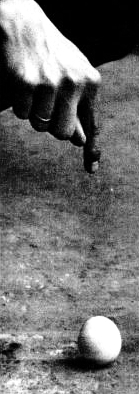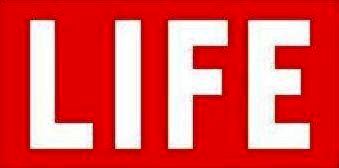

|

CHUNGKING
Eggs in Chungking stand on end. They are standing on end on lawns, on walls, on dance floors and on diplomatic dinner tables. There is no more doubt about it. Most of Chungking's population has stood them.Just when this first happened, no one knows. The earliest records of the event are to be found in Secret Kaleidoscope and Know What Heaven Knows, two Chinese books of certain antiquity but undetermined date. The legend goes like this: One day each year - a day of variable date like the American Thanksgiving - and at a certain hour, winter goes and spring comes. This day is called Li Chun or "Spring Begins." For an hour before and an hour after the season's change, eggs will stand on end.
Not everyone in China knows this, not having read what heaven knows. But one who does is Mr. Yang Hsou Chen, and officer of the Chinese Ministry of Information. Mr. Yang is the man behind the current egg boom. Like any father interested in giving his children a liberal education, he mentioned that eggs would perform during the first hour of spring.
Spring was expected this year at 1 o'clock on the 22nd day of the 12th lunar month, or Feb. 4. By noon that day Yang's yard bloomed with standing eggs. Wei Hsaio Meng, aged 12, looked across from the yard next door and told her father, Jimmy Wei, who holds a unique position in relation to foreign correspondents. He combines the functions of chief censor, trouble shooter, World Almanac and Peter Pan.
Jimmy promptly stood up more eggs in his own yard than Yang had stood. Walter Rundle of United Press watched suspiciously. Rundle stood several himself and went away trying to remember just what happened between Christopher Columbus and the egg.
Next to walk be were Richard Baker and Anthony Dralle, professors in the Chinese government school of journalism. They took turns at balancing with good results. Dralle crushed one egg and satisfied himself that is was raw and unstuffed.
Jimmy Wei then moved to a bigger audience on the lawn of the neighboring Press Hostel. He found newsmen for the most part uninterested since this was a gray Sunday morning which followed Saturday night. Two small dogs were appreciative but they seemed more hungry than scientific, so Mr. Wei retired to his own yard and stood up more eggs, 21 in all.
Several private experiments followed. The eggs were fresh, said those who ate them the next morning. The yolks were not broken nor was there glue on the shells. No wire, rocks or other supports were used. The earth was smooth and hard. There was no getting away from it, the eggs stood on end.

|
Several correspondents sent the story to their newspapers. More overlooked the whole thing. As one explained simply, "Do I want the home office to think I'm crazy?"
The nest morning news came from America that Rundle's story saying eggs stood on end had been read by Albert Einstein and that Einstein doubted it. But since the books said eggs would stand for only two hours each year there seemed little to be done about it.
For the first time, however, the Chungking hen got some attention. Almost every open-front shop keeps a single hen tethered by the leg. Hens live on wooden floors, on gravel piles or in mud puddles. Some wondered if the knowledge that eggs now cost $25 Chinese had not perhaps gone to the heads of the hens, who remember 1939 when the market price for their product was two cents. Three successive residents, when asked, "What do you feed the hen?" answered with sincere amazement, "Ni hsou wei chi, ni hsih shih mo i-sze?" or, "What do you mean, feed the hen?"
Except for local attacks on Einstein, nothing happened in the egg line for the next week. The local press said the Smithsonian Institution didn't believe the story either. Chungking was divided into two camps - those who had stood eggs and those who asked why the first group didn't just admit they were drunk. Then came word that every American magician knew the trick - that if the egg was shaken until the yolk broke it would stand. Rundle resented the idea that a broken yolk had been palmed off on him. On Feb. 11 he and Baker asked the hostel's cook for two eggs. To their joy the eggs stood as well as they had the week before. Being hungry by that time, they boiled one egg and fried the other. They reported that the hard-boiled egg, with its yolk unbroken, also stood on end until they ate it.
 Thirty-five eggs stand (right), without support, on battered lawn of Chungking's Press Hostel at a press conference held on Feb. 21.
The egg at the left and the one in the back row are resting.
Practitioners here are Executive Yuan Spokesman P. H. Chang (with hat) and Press Censor Yao (right).
Egg in the foreground is standing on its small end.
Thirty-five eggs stand (right), without support, on battered lawn of Chungking's Press Hostel at a press conference held on Feb. 21.
The egg at the left and the one in the back row are resting.
Practitioners here are Executive Yuan Spokesman P. H. Chang (with hat) and Press Censor Yao (right).
Egg in the foreground is standing on its small end.
|
This revived the whole business of eggs and offered a welcome change from the Communist problem.
On Feb. 17 the director of the International Department of the Ministry of Information gave a dinner party. He had ten guests and he gave each an egg. Eight of the ten made their eggs stand upright on the table.
On Feb. 21 the regular weekly press conference talked about currency stabilization, postwar planning and the Communist problem, then moved to the hostel lawn to stand up eggs. With 50 people looking on, Wong Wen Hao, head of the Chinese War Production Board and Minister of Economic Affairs, stood up an egg and said it was very interesting. Seventy-five eggs in all were stood some several times apiece, on earth, sidewalks and wooden steps. It had been planned to spell out in eggs, "Nuts to Einstein" but there were some who thought this undignified.
The first eggs to stand on dance floors were at the home of Martin Gold of the William Hunt Company. Seventy people looked on at the ceremony. Poles stood eggs, so did Russians and French. But perhaps the most thorough egg-standers were the Canadians. According to Ralph Collins, second secretary of the Canadian Embassy, four eggs stood on the embassy steps for ten hours. They were put in place at 8:30 in the morning. All were still erect at 6:30 that evening. This report, said Collins, will be submitted to the Canadian government.
Standing eggs did not have the official approval of the U.S. Army until they were mentioned at a dinner given by Dr. Sun Fo, president of the Legislative Yuan. Dr. Sun promptly called for eggs and the next course was delayed while every guest tried for himself. Major General Albert Wedemeyer, commanding general of U.S. forces in China, showed outstanding ability.

|
The correspondents then decided that the ideal picture would be the Generalissimo and Mao Tze Tung, Communist leader, watching an egg standing on a mirror. The picture was eventually taken, minus the Generalissimo and Mao Tze Tung.
Most of the Far East was convinced but no one had an explanation. Mystics admitted with regret that the old Chinese legend which talked about the one magic day each year had been knocked cold. A few mentioned lunar influences but all agreed that even a virile lunar influence would hardly last a month.
An expert emerged in the person of Dr. Wang Fu Shih, DSC, brilliant young graduate of Munich Technological Institute, holder of several electronic patents. Dr. Wang believed that a scientific explanation could be found for anything. He carried on extensive experiments and arrived at Press Hostel armed with test tubes, eggs and a theory. The reason, he said, is temperature and gravity. He explained that, according to all laws of mathematics, nothing can be balanced if its center of gravity is higher than its middle. Likewise nothing can be balanced on a single point. He then proceeded to take apart Einstein. A balanced egg is not an illustration of point contact, said Dr. Wang. He put lipstick on one egg, measured the mark it left after standing, concluded that the surface of contact is at least two square millimeters. Then he turned to the egg's center of gravity. In cold weather the egg's contents contract. This leaves a larger air space and lowers the center of gravity. In addition he believes that various parts of the egg have different expansion coefficients - the runny part gets runnier and the heavy part gets heavier. This makes it possible for a heavy yolk to sink toward the bottom. Dr. Wang believes that the egg would stand on the hottest summer day if first chilled in the refrigerator. This particular experiment will have to be done in America, however, where there are refrigerators. It may also be, he adds, that the hen's food at this time of year contributes to the liquidity of the egg. Liquidity, to sum up, is the secret of it all.
Dr. Wang was distressed to admit the exception. He had emptied one shell, he reported, and the empty shell also stood on end. This, he said, was difficult to explain. He was more distressed to learn that the hard-boiled egg, which is not at all liquid, would stand. And when photographers reported that their flash bulbs have been balancing easily for the past few weeks, he left to conduct further experiments.
And there the matter stands.

